Planning worship?
Check out our sister site, ZeteoSearch.org,
for 20+ additional resources related to your search.
- |
User Links
Person Results
William Adair Pickard-Cambridge
1879 - 1957 Meter: 8.8.7.8.8.7 Harmonizer of "STABAT MATER DOLOROSA (Kirnberger)"
William Adair Pickard-Cambridge
J. C. Aaberg
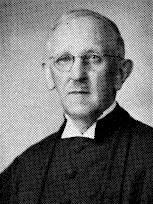
1877 - 1970 Meter: 8.8.7.8.8.7 Translator of "Softly Now The Day Is Ending" in American Lutheran Hymnal Jens Christian Aaberg (b. Moberg, Denmark, 1877; d. Minneapolis, MN, 1970) immigrated to the United States in 1901. Educated at Grand View College and Seminary in Des Moines, Iowa, he entered the ministry of the Danish Evangelical Lutheran Church in America and served congregations in Marinette, Wisconsin; Dwight, Illinois; and Minneapolis, Minnesota. Aaberg wrote Hymns and Hymnwriters of Denmark (1945), translated at least eighty hymns from Danish into English, and served on four hymnal committees. In 1947 King Frederick of Denmark awarded him the Knight Cross of Denmark.
--Psalter Hymnal Handbook, 1987
J. C. Aaberg
A. P. Berggreen
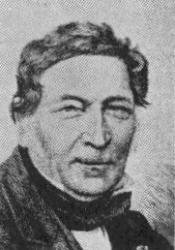
1801 - 1880 Person Name: A. P. Berggren Meter: 8.8.7.8.8.7 Composer of "EVEN SONG" in American Lutheran Hymnal Andreas Peter Berggreen, born in Copenhagen, March 2, 1801. Instrumental and vocal composer; took up music as a profession after having first been compelled to study law, became organist at Trinity Church, Copenhagen, in 1838, professor of vocal music at the Metropolitan School in 1843, and inspector of the same branch in all public institutions. Works: Collection of songs, with guitar (Copenhagen, 1822-1823); Romances (1823); Ballads and Romances (1824); Variations for guitar (1825); Wedding Cantata (1829); Billedet og bustan (The Portrait and the Bust), comic opera given at Copenhagen, 1832; Songs for the use of schools (1834-39); Popular songs and national and foreign melodies, for pianoforte (1842-47); Twelve Swedish songs (1846); National songs (1848); Songs to poems of Bellmann (1850); Six Swedish songs of Runeberg (1852); Several cantatas.
Cyclopedia of Music and Musicians by John Denison Camplin, Jr. and William Foster Apthorp (Charles Scribner’s Sons, 1888)
https://archive.org/details/cyclopediaofmusi01cham/mode/2up
A. P. Berggreen
Federico Fliedner

1845 - 1901 Person Name: Federico Fliedner, 1845-1901 Meter: 8.8.7.8.8.7 Translator of "Fiesta de la primavera" in Culto Cristiano [Friedrich Ludwig Fliedner, Fritz Fliedner]
Born: June 10, 1845, Kaiserswerth, Düsseldorf, Germany.
Died: April 25, 1901, Madrid, Spain, of typhus.
Buried: Civil cemetery, Madrid, Spain.
Son of Theodor Fliedner, founder of the Kaiserswerth Deaconess Institute, Federico was educated at the Gymnasium in Gütersloh, studied theology at Halle (1864-46) and earned his PhD at Tübingen (1867). He served as a nurse in the Austro-Prussian war of 1866, and taught school for a year in rural Hilden. After ordination in 1870, he left Germany to be a missionary to Spain, settling in Madrid and becoming a chaplain at the German embassy. He learned Spanish, attended a Spanish high school, and studied medicine at the Universidad Central.
Fliedner was instrumental in creating what is now known as the Iglesia Evangélica Española. In 1873, Fliedner founded the Librería Nacional y Extranjera, an extensive collection of text books and periodicals. Among these was The Children’s Friend, published from 1874 to 1939.
Fliedner wrote biographies of John Howard, Elizabeth Fry, missionary-explorer David Livingstone, Martin Luther (1878), and his own parents, Theodore Fliedner of Kaiserswerth (1883) and Caroline Fliedner of Kaiserswerth (1883). He also wrote an autobiography, published first in German in two volumes (Aus meinem Leben, 1901-03), then translated into Spanish and published posthumously in the Christian Magazine (Nos. 513 to 553). He started a Spanish translation of the New Testament with notes from Frenchman Edouard Faivre.
--www.hymntime.com/tch
Federico Fliedner
Gerard Francis Cobb
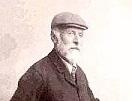
1838 - 1904 Person Name: Gerard F. Cobb, 1838-1904 Meter: 8.8.7.8.8.7 Composer of "LAUDA SION" in The Hymnal Gerard Francis Cobb was born at Nettlestead (near Maidstone), Kent, on 15 October 1838, the youngest of five children of the Reverend William Francis Cobb (1795-1862) - the rector of Nettlestead - and his wife, Mary Blackburn. The five children were:- 1. Mary (1826-1906), 2. Clement Francis (1821-1896), 3. William Francis (1831-1916), 4. Francis (1834-1920), and 5. Gerard Francis (1838-1904). (The patronymic ‘Francis' occurs in several generations. Gerard's grandfather was Francis Cobb (1759-1831), a brewer and banker of Margate, whose sons were William Francis (Gerard's father), John Francis and Thomas Francis. Gerard's brother Clement also had a son Francis William (1872-1938). The parents were both musical, the mother being a pianist (and latterly organist at Nettlestead) and the father a ’cellist. Gerard early showed an aptitude for music and was able to pick out a tune on the piano while still a child, and without any formal instruction.
Gerard Francis Cobb was educated at Marlborough College from 1849 to 1857. (His brothers William and Clement were also educated there.) He was a bright pupil, reaching the Sixth Form in September 1854 (still aged 15) and winning several prizes - the Divinity Prize (Summer 1853), the Upper Fifth Prize (Summer 1854), the Lower Sixth Prize (Christmas 1854) and the English Essay Prize (1856). He was also appointed a College Prefect and (when he left school) donated a cup as an inter-house singing trophy. (Inter-house singing competitions continue to be popular at Marlborough to this day.) Two concert programmes from Marlborough College (Christmas 1854 and Christmas 1856) show his active involvement as singer, pianist and harmonium player, although in neither programme is there any indication of a composition by him.
From Marlborough Cobb went up to Trinity College, Cambridge, matriculating in 1857. He was elected a Scholar in 1860, and graduated B.A. in 1861 with a double first in the Classical and Moral Science Triposes. He then went to Dresden for a short time, to study music. While there, he perfected his knowledge of German, later providing English translations for three of the texts of his own Lieder und Gesang (1885); he was also proficient in French and Italian, as well as being an excellent classical scholar. (Cobb wrote the words of at least one of his own songs - "Reconciliation" (c.1891) - and inserted a verse of his own into another song - "Drawbacks" (1892), words by Henry S. Leigh.)
It may have been at this time that he decided not to make music his profession: he returned to Cambridge, where he spent the rest of his life. He was elected a Fellow of Trinity in 1863, proceeding M.A. in 1864, and in 1869 was appointed Junior Bursar of his college. This office, which he held for twenty-five years and in which he showed great business capacity, seems to have centered around the day-to-day running of the college, which included looking after the accommodation of some six hundred students (Trinity was the largest of all the Oxbridge colleges) and even making sure that the brewery horse had the correct number of nails in his shoes! (The college had a small brewery).
Cobb's interests were many and varied. There was music, of course, but (appropriately, as the son, brother and uncle of rectors) he was also much interested in Church matters: he was in sympathy with the Tractarian movement (associated with Newman, Pusey, Keble, Forbes and Froude) and at one time contemplated (but finally declined) holy orders. He actively advocated union between the Anglican and Roman communities, and published an elaborate treatise which caused a sensation in ecclesiastical circles. A second edition (with a sequel) followed and this, in turn, was followed by two short tracts. Even as late as the 1860s there was a form of religious intolerance which although not life-threatening (as in the reigns of earlier monarchs) nevertheless ensured that a career in the Church would no longer be an option for Cobb. His appointment at Trinity was timely, and his energies were then directed towards the running of the College and to the pursuit of music.
Cobb was a fine organist, and gave occasional recitals at Trinity. His writings include a history of the organ and an account of the choir which, apparently, he also trained. He was, too, the University’s representative on municipal affairs and produced pamphlets on rather more mundane matters than were normally dealt with in "the olive-grove of Academe".
When Cobb went up to Trinity in 1857 the Professor of Music was the recently appointed (1856) William Sterndale Bennett (1816-1875). Cobb enjoyed Bennett's friendship and was helpful to him in dealing with the Faculty of Music. In the last years of his life, Bennett made use of two bound octavo music note-books in which he jotted down sketches and ideas; these books had been brought to him from Germany by Cobb.
On Bennett's death, the Professorship passed to the blind George Macfarren (1813-1887). Cobb proved equally helpful to the new incumbent, particularly in the reform of the Faculty. He had been elected President of the Cambridge University Musical Society in 1874 and became Chairman of the University Board of Musical Studies in 1877, serving in that capacity for fifteen years.
Aside from his work at Trinity, and his musical, religious, and municipal interests, there is yet one more facet of this Victorian polymath which must command our attention. He was, perhaps surprisingly, a great lover of outdoor activities - swimming, walking, hill climbing, and - above all - cycling. He was one of the founders - and first President (1878) - of the National Cyclists' Union (originally the Bicycle Union) and was also President of the Cambridge University Cycling Club. For the International Health Exhibition (1884) he contributed a chapter on 'Cycling' to the handbook on athletics, part 11.
Cobb thought so much of cycling that his enthusiasm induced not only undergraduates but even many of the Dons to take to it (33). He celebrated his sixtieth birthday by undertaking a cycle run of sixty miles in company with one of his nephews. Cobb was not very tall and was almost equalled in height by his earlier high cycle, although in later years he rode what was then called a 'safety cycle' (which was smaller) and, eventually a 'free wheel bicycle'. (The cycle which features in the accompanying photograph is presumably a 'safety' or 'free wheel' machine.)
Little is known of Cobb's life outside Cambridge. His duties at Trinity would have kept him there for most of the year, and his dealings with his London publishers were probably conducted by letter. His name appears on the invitation lists of several of the Royal Society of Musicians' annual dinners in the 1880s and, although he did not attend any of these, he is recorded as having made several donations to the Society.
In 1893 Cobb married Elizabeth Lucy Parkinson, widow of Stephen Parkinson, Fellow and Tutor of St. John’s College, Cambridge, and (in accordance with the custom of the time) resigned his offices at Trinity. He continued to reside in Cambridge - at The Hermitage Silver Street - and devoted himself mainly to musical composition. From this last period of his life came the second (1893) and third (1897) sets of Barrack-Room Ballads (the first having appeared in 1892) and his delightful Twenty-four Songs for Little People (1897) to words by Norman Gale (d. 1942), as well as works on a larger canvas, including his most ambitious work - A Song of Trafalgar Op. 41, a Ballad for men's voices (solo and chorus) and orchestra (1900), to words by Edith Nesbit (1858-1924) - remembered today as the author of The Railway Children (1906).
Among Cobb's large-scale works is reputed to be a Symphony although no trace of this has yet come to light. What can be stated with certainty, however, is that on 27 November 1902 a concert was held at the Winter Gardens, Bournemouth, given by the Municipal Orchestra under the direction of Dan Godfrey, jun. - later Sir Dan Godfrey (1868-1939) - and Gerard Cobb, who conducted "For the first time in Bournemouth" (and probably the first time anywhere) three of his own works - Introduction and Allegro Giocoso in B flat, Valse Pathétique 'Niobe', and Romanza for Orchestra, in E flat (performed at a Prom in 1901); two of Cobb's earlier songs - "I wish to tune my quivering lyre" (written in 1868) and "Mount, Gallants all!" (published c.1890 were sung by Henry Corner. (An orchestral score and band parts for "Mount, Gallants all!" were available for hire from the publishers, and it must be assumed that both songs were given with orchestral accompaniment.)
Cobb's last-known compositions were three further settings of poems by Kipling - not from the Barrack-Room Ballads this time, but from a similar collection, Service Songs. The three songs. - "M.I." (Mounted Infantry of the Line), "The Married Man" (Reservist of the Line), and "Lichtenberg" (New South Wales Contingent) - had been commissioned by Charles Sheard, who had published his settings of the Barrack-Room Ballads and they were completed just a few days before his death. Sheard published them later that year.
Gerard Francis Cobb died at The Hermitage on 31 March 1904. having succumbed to an attack of pneumonia. He was cremated at Woking on 5 April at 12.00 noon, at which precise time a memorial service was held at Trinity College Chapel; the music was all by Cobb. His ashes were laid to rest on 8 April in the churchyard at Nettlestead, where his widow erected a handsome cross in his memory.
http://www.musicweb-international.com/classrev/2004/oct04
Gerard Francis Cobb
John J. Overholt
1918 - 2000 Meter: 8.8.7.8.8.7 Translator of "Come unto me, saith God's own Son" John J. Overholt was born to an Amish family of limited means in the state of Ohio in 1918. As a child he was soon introduced to his father's personal collection of gospel songs and hymns, which was to have a marked influence on his later life. With his twin brother Joe, he early was exposed to the Amish-Mennonite tradition hymn-singing and praising worship.
An early career in Christian service led to a two-year period of relief work in the country of Poland following World War II. During that interim he began to gather many European songs and hymns as a personal hobby, not realizing that these selections would become invaluable to The Christian Hymnary which was begun in 1960 and completed twelve years later in 1972, with a compilation of 1000 songs, hymns and chorales. (The largest Menn. hymnal).
A second hymnal was begun simultaneously in the German language entitled Erweckungs Lieder Nr.1 which was brought to completion in 1986. This hymnal has a total of 200 selections with a small addendum of English hymns.
Mr. Overholt married in 1965 to an accomplished soprano Vera Marie Sommers, who was not to be outdone by her husband's creativity and compiled a hymnal of 156 selections entitled Be Glad and Sing, directed to children and youth and first printed in 1986.
During this later career of hymn publishing, Mr. Overholt also found time for Gospel team work throughout Europe. At this writing he is preparing for a 5th consecutive tour which he arranges and guides. The countries visited will be Belgium, Switzerland, France, Germany, Poland, USSR and Romania.
Mr. Overholt was called to the Christian ministry in 1957 and resides at Sarasota, Florida where he is co-minister of a Beachy Amish-Mennonite Church.
Five children were born to this family and all enjoy worship in song.
--Letter from Hannah Joanna Overholt to Mary Louise VanDyke, 10 October 1990, DNAH Archives. Photo enclosed.
John J. Overholt
Johann Adam Hiller
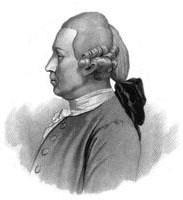
1728 - 1804 Meter: 8.8.7.8.8.7 Adapter of "HILDESHEIM" in American Lutheran Hymnal Born: December 25, 1728, Wendisch-Offing (near Görlitz), Germany.
Died: June 16, 1804, Leipzig, Germany.
Johann Adam Hiller
Jacopone, da Todi
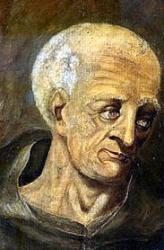
1230 - 1306 Person Name: Jacobus de Benedictis Meter: 8.8.7.8.8.7 Author of "Near the Cross Was Mary Weeping" in The Hymnal and Order of Service Jacobus de Benedictis, commonly known as Jacopone, was born at Todi in Umbria, early in the 13th century, his proper name being Jacopone di Benedetti. He was descended from a noble family, and for some time led a secular life. Some remarkable circumstances which attended the violent death of his wife, led him to withdraw himself from the world, and to enter the Order of St. Francis, in which he remained as a lay brother till his death, at an advanced age, in 1306. His zeal led him to attack the religious abuses of the day. This brought him into conflict with Pope Boniface VIII., the result being imprisonment for long periods. His poetical pieces were written, some in Italian, and some in Latin, the most famous of the latter being "Cur mundus militat sub vana gloria" (possibly by Walter Mapes), and the "Stabat Mater dolorosa." Archbishop Trench says of him:—
“An earnest humourist, he carried the being a fool for Christ into every-day life. The things which with this intent he did, some morally striking enough, others mere extravagances and pieces of gross spiritual buffoonery—wisdom and folly, such as we often find, side by side, in the saints of the Roman Calendar—are largely reported by Wadding, the historian of the Franciscan Order, and by Lisco, in a separate monograph on the Stabat Mater, Berlin, 1843, p. 23. These often leave one in doubt whether he was indeed perfectly sound in his mind, or only a Christian Brutus, feigning folly, that he might impress his wisdom the more deeply, and utter it with more freedom." Sacred Latin Poetry, 3rd ed., 1874, p. 268.
Sketches of the life and writings of Jacopone, drawn entirely from the original sources (Trench), have been published as follows:—
(1) By Mohnike, Studien Stralsund, 1825, vol. i. pp. 335-406; (2) by Ozanam, Les Poétes Franciscains en Italie au Treizieme Siecle, Paris. In addition there are articles in the Biographie Universelle; Macmillan’s Magazine, Aug., 1873; and the Encyclopedia Britannica , 9th ed.
--John Julian, Dictionary of Hymnology (1907)
============================
See also in:
Wikipedia
Jacopone, da Todi
John Kelly
1833 - 1890 Meter: 8.8.7.8.8.7 Translator of "O Father! send Thy Spirit down" in Paul Gerhardt's Spiritual Songs Kelly, John, was born at Newcastle-on-Tyne, educated at Glasgow University, studied theology at Bonn, New College, Edinburgh, and the Theological College of the English Presbyterian Church (to which body he belongs) in London. He has ministered to congregations at Hebburn-on-Tyne and Streatham, and was Tract Editor of the Religious Tract Society. His translations of Paul Gerhardt's Spiritual Songs were published in 1867. Every piece is given in full, and rendered in the metre of the originals. His Hymns of the Present Century from the German were published in 1886 by the Religious Tract Society. In these translations the metres of the originals have not always been followed, whilst some of the hymns have been abridged and others condensed. His translations lack poetic finish, but are faithful to the originals. [Rev. W. Garrett Horder]
-- John Julian, Dictionary of Hymnology (1907)
==================
Kelly, John, p. 614, i. He died while on a visit to Braemar, July 19, 1890.
--John Julian, Dictionary of Hymnology, Appendix, Part II (1907)
John Kelly
Johann Löhner
1645 - 1705 Person Name: Johan Löhner, 1645-1705 Meter: 8.8.7.8.8.7 Harmonizer of "ALLES IST AN GOTTES SEGEN" in The Hymnal 1982
Johann Löhner


 My Starred Hymns
My Starred Hymns


